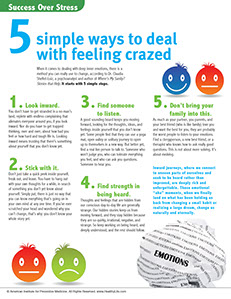SYMPTOM CHECKER
CONDITIONS
Male
Female
Child
Arm, Hand & Shoulder Concerns
Legs & Feet Concerns
Dental & Mouth Concerns
Ear & Nose
Eye Conditions
Head Conditions
Arm, Hand & Shoulder Concerns
Legs & Feet Concerns
Front
Back
Arm, Hand & Shoulder Concerns
Dental & Mouth Concerns
Ear & Nose
Eye Conditions
Head Conditions
Arm, Hand & Shoulder Concerns
Dental & Mouth Concerns
Ear & Nose
Eye Conditions
Head Conditions
Front
Back
Arm, Hand & Shoulder Concerns
Neck Links
Head & Neck Concerns
Arm, Hand & Shoulder Concerns
Neck Links
Head & Neck Concerns
Front
Back
Online Clinic
Wise Healthcare
5 simple ways to deal with feeling crazed
Print on Demand
When it comes to dealing with deep inner emotions, there is a method you can really use to change, according to Dr. Claudia Sheftel-Luiz, a psychoanalyst and author of Where’s My Sanity? Stories that Help. It starts with 5 simple steps.
1. Look inward.
You don’t have to get stranded in a no-man’s land, replete with endless complaining that alienates everyone around you, if you look inward. Nor do you have to get trapped thinking, over and over, about how bad you feel or how hard and tough life is. Looking inward means trusting that there’s something about yourself that you don’t know yet.
2. Stick with it.
Don’t just take a quick peek inside yourself, freak out, and leave. You have to hang out with your own thoughts for a while, in search of something you don’t yet know about yourself. Simply put, there is just no way that you can know everything that’s going on in your own mind at any one time. If you’ve ever scratched your head and wondered why you can’t change, that’s why: you don’t know your whole story yet.
3. Find someone to listen.
A good sounding board keeps you moving forward, looking for the thoughts, ideas, and feelings inside yourself that you don’t know yet. Some people find that they can use a yoga mat, open valley or solitary journey to open up to themselves in a new way. But better yet, find a real live person to talk to. Someone who won’t judge you, who can tolerate everything you feel, and who can ask you questions. Someone to hear you.
4. Find strength in being heard.
Thoughts and feelings that are hidden from our conscious day-to-day life are generally strange. Our hidden stories keep us from moving forward, and they stay hidden because they are so quirky, irrational, negative, and strange. So keep working on being heard, and deeply understood, and the rest should follow.
5. Don’t bring your family into this.
As much as your partner, you parents, and your best friend (who is like family) love you and want the best for you, they are probably the worst people to listen to your emotions. Find a clergyperson, a new best friend, or a therapist who knows how to ask really good questions. This is not about more solving. It’s about evolving.
Inward journeys, where we connect to unseen parts of ourselves and seek to be heard rather than improved, are deeply rich and unforgettable. Those emotional “aha” moments, when we finally land on what has been holding us back from changing a small habit or realizing a large dream, change us naturally and eternally.
This website is not meant to substitute for expert medical advice or treatment. Follow your doctor’s or health care provider’s advice if it differs from what is given in this guide.
The American Institute for Preventive Medicine (AIPM) is not responsible for the availability or content of external sites, nor does AIPM endorse them. Also, it is the responsibility of the user to examine the copyright and licensing restrictions of external pages and to secure all necessary permission.
The content on this website is proprietary. You may not modify, copy, reproduce, republish, upload, post, transmit, or distribute, in any manner, the material on the website without the written permission of AIPM.
2021 © American Institute for Preventive Medicine - All Rights Reserved. Disclaimer | www.HealthyLife.com
















































